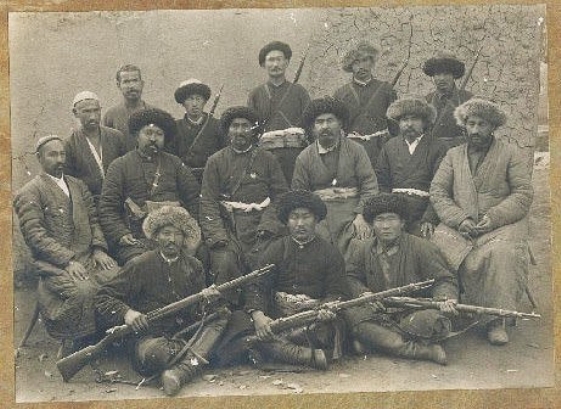Basmachi: An Inspiration Behind Afghan Mujaheddin
| Date: 10-Apr-2020 |
By Shambhavi Pramod Thite
Under the Soviets, there were campaigns intended to eradicate Islam from Central Asia. After the 1917 Revolution, Bolsheviks were looking towards socialism as faith for the entire region, Central Asia was still engaged in tribal and nomadic societal affairs. Despite the imperial conquest of the Russian empire in 19th century, the social and political structures of the local population were barely affected and remained virtually untouched as since the Middle Ages Turkestan was the important centre of Islamic civilization. The Bolshevik attempt to penetrate the Muslim society of Central Asia with socialist agenda met with strong local resistance. Which led to years of armed conflict, known as the Basmachi revolt, 60 years later it became an ideological driving force behind insurgency of Afghan Mujahideen.

A Basmachi Squad: Source Reddit
The Basmachi rebellion began in Ferghana Valley, then situated in Turkestan region (currently, situated between eastern Uzbekistan, southern Kyrgyzstan and Northern Tajikistan) in 1918 where a local chief ‘Irgash’ massacred Russian troops. It was born out of Bolshevik’s refusal acknowledge complexities existed in Islamic social structure of the region. After the coup of 1978 in Afghanistan, the Afghan communist party did similar mistakes. Introduction of radical modernization reforms throughout the country deeply impacted existing social power structures. In both the scenarios Soviet forces were totally alienated from the very people they were supposed to be leading and educating. Ignorance towards history and culture of the region, which soviet considered backward led to a power struggle in the region. During Basmachi revolt, British India encouraged King Amanullah Khan of Afghanistan to send caravans loaded with arms and ammunition to Ferghana Valley, while during soviet invasion America provided aid to Mujahideen through Inter-service intelligence of Pakistan.
The episode of Enver Pasha (1881-1922) an ambitious Turkish army officer who convinced Lenin to send him to Bukhara to raise an army against Basmachi rebels and joined Basmachi instead became life story of many soviet soldiers who were sympathetic towards Afghan Mujahideen. A handful of Russian soldiers had defected and joined the Afghan Mujahideen. In Mujahideen camps they came across intolerant Wahabi doctrine of the Arab volunteers. Wahabi Salafist ideology was very appealing because of the practice of organized political Islam. The traditional culture of Central Asia was majorly based on Sufism which had no political ambitions. Enver Pasha and defected Russian soldiers had a similar dream. The dream of reuniting the Islamic world against atheist soviets.
Throughout history, western powers had always used Islam as a mean to undermine communism in Central Asia. In 1920, British India supported the Basmachis with Arms and Money. In October 1939, Fitzroy Maclean, a British diplomat and secret agent, advised British government in a secret memorandum that Britain should help mullahs in Central Asia to whip up Islamic feeling in the region in order to prevent Russia invading Turkey and Iran as Germany fought Britain. In 1979, America provided support to radical Islamists of Central Asia through the Afghan war to undermine the communist ideology of soviets. CIA funded Mujahideen to smuggle Qurans, radical tape recordings and weapons to Islamic groups in Ferghana valley. Both the times and even after the breakup of Soviet Union, instead of supporting moderate Islam the communist leaders took harsh measures to eradicate political Islam which gave propaganda to Islamic militants to accuse the soviet and post-soviet leaders of being non-believers or a crypto-enemies of Allah.
Mir Saeed Sultan Galiev (1880-1939) advocate of separate Muslim communist party also demanded the creation of an Independent Red Army. He argued that locally recruited army which is aware of local traditions and customs could be critical importance in spreading Bolshevik revolution. But Bolsheviks rejected the idea of Nationalist Populist army. Stalin was later to treat such suggestions as treason. Galiev’s views were later adopted by Mao Zedong in China and Ho Chi Minh in Vietnam who led nationalist-communist revolutions. The USA understood this phenomenon and supported tribal forces against Soviets in Afghanistan. However, the Communist Party of Soviet Union (CPSU) made same mistake when they invaded Afghanistan where it applied the same tactics as it had in Central Asia and had same disastrous results.
Soviet suppressed Basmachi revolt brutally by 1922 and eradicate completely by 1935. Despite the strong resistance by Basmachi rebels’ ideological conflict between Islamic fundamentalist and Islamic modernists known as Jadids easily allowed Bolsheviks to crush the movement. The USA understood the power of religion to unite different tribal and ethnic groups in Afghanistan and gained support from Muslim modernist and nationalists to create sympathetic international agenda towards Mujahideen led to the withdrawal of Soviet forces from Afghanistan after 9 years long proxy war and Mujahideen victory in 1992.
(Shambhavi Pramod Thite is a scholar in Central Eurasian Studies in Mumbai University and is Conducting research on cultural conflicts, security dynamics and counter-terrorism measures in the Central Asian region.)